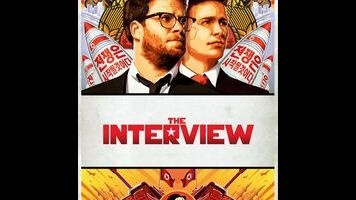The Interview is a triumph of free speech, not of sharp satire

The Interview was controversial from the start, yet even two weeks ago, seeing the movie at a press screening at the Regal E-Walk in Times Square, it was hard to imagine that the presentation might be historic—perhaps the only opportunity to watch a James Franco–Seth Rogen comedy at the country’s largest theater chain. Even now, after the White House has weighed in, the film is receiving only a token release. Alas, the movie in question is hardly a modern Dr. Strangelove or a take-no-prisoners sendup in the vein of South Park: Bigger, Longer & Uncut. Still, standard-bearers for the First Amendment often come in unlikely forms. Sometimes—and certainly in the case of this scattered, ceaselessly ass-obsessed comedy—freedom means standing up for satirists’ right to make fun of a head of state’s bowel functions.
Because many of the best jokes in The Interview have nothing to do with North Korea, it’s worth recapping the ancillary mayhem that the Sony hackers would have suppressed. Franco stars as Dave Skylark, the foppish, airheaded host of a celebrity gossip program. He scores a coup when Eminem, on camera, makes an offhand announcement that he’s gay, prompting elation in the control room. Another of Dave’s scoops involves Rob Lowe’s coming-out as a secret bald person (“His head looks like somebody’s taint!” someone from the booth exclaims). But Dave’s producer, Aaron (Rogen), yearns for credibility. A larky call lands them an interview with Kim Jong-un (Veep’s Randall Park, a worthy foil to his better-known co-stars), supposedly a Skylark superfan. Soon, the CIA turns up with a request that the two assassinate him.
Their training, at which it’s never quite clear to Dave that a CIA agent (Lizzy Caplan) is manipulating them (Aaron calls it “honeypotting”—it’s “honeydicking” when a man does it), strays a bit far from the main satirical target. And there are other stretches when the comedy goes slightly flat or off-topic. Aaron has an encounter with a Siberian tiger and flirts with a foxy propagandist (a game Diana Bang); there is endless talk of whether a large object should be shoved up a bodily orifice. Much of the film is devoted to the hit-and-miss (but strangely moving) riffing between the leading men.
But the North Korea scenes are often very funny, with many of the jokes coming at the expense of the fish-out-of-water visitors. Dave is the kind of person who, as small talk, will casually say that he hears the entire nation is starving to death. The central conceit, hardly unique to the movie, is that Kim turns out to be a misunderstood bro and secret softy who likes blasting Katy Perry’s “Firework” while driving his vintage tank. “You know what’s more destructive than a nuclear bomb?” he asks Dave as the two go one-on-one on the basketball court. “Words.”
Even in a comedy with such a fearlessly tasteless premise, this is a punch that seems destined to be pulled. Any (former) mass-release movie is likely to have its share of sermonizing. Dave will discover that North Korea’s grocery stores aren’t Pyongyang’s answer to Whole Foods, and he and Kim will not negotiate a peace treaty over a couple of brewskis. Having ended the world just last year in This Is The End, Rogen and his co-director, Evan Goldberg, can’t exactly play that card again. The content of the movie’s finale has already been widely reported. By the standards of Cold War pop-music score-settling, it’s not as cataclysmic as the “We’ll Meet Again” sequence from Dr. Strangelove, but it is more violent than any montage in Rocky IV.